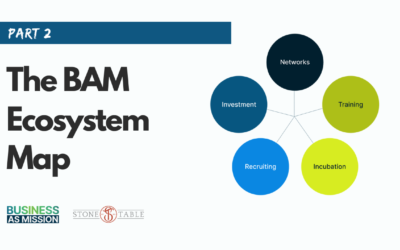Workism: The Most Terrifying Thing I Face as a Christian Marketplace Leader

Being a leader of any kind is scary. The responsibility can be incredibly heavy – for the vision, for the finances, for the people, for the impact on your family. But over the past few years, I’ve uncovered the most terrifying reality I face as a Christian leader in the marketplace. It literally keeps me up at night. It’s a danger of the highest order.
It’s the unrepentant me.
I am reading through the Scriptures chronologically this year, following a powerful devotional called Missionary God, Missionary Bible, by my friend Dick Brogden. I’ve spent the last month or so in the books of Samuel, Kings, and Chronicles, offset by short trips into Jonah, Amos, Isaiah, and Micah, books that illuminate the prophetic voices that were speaking into the leaders of the times. In terms of a “workism”, it’s been sobering, to say the least.
Following the golden age of King David and (most of) King Solomon, there were plenty of just plain old outright evil leaders; kings that abandoned the worship of the one true God right from the outset and surrendered to all flavors of idolatry, scandal, and licentiousness. But there’s a repetitive pattern that concerns me at a much higher level: leaders who started well but finished as a complete dumpster fire. The stories often replicate this description of Rehoboam:
“When the rule of Rehoboam was established and he was strong, he abandoned the law of the Lord, and all Israel with him.” (2 Chronicles 12:1)
Why in the world is this narrative repeated so often throughout the Scriptures? Why is this type of “toxic leadership workism” recreated so often today? This is what terrifies me most as a Christian marketplace leader.
Rise and Fall
In addition to these Scriptural warnings, I’ve been simultaneously listening to a podcast I kept seeing flash through my social media feeds. The Rise and Fall of Mars Hill follows the meteoric rise and disastrous downfall of Mark Driscoll and Mars Hill Church in Seattle from the late 90s through the first two decades of the new millennium. I usually try to avoid salacious stories like this, fearing they’re just hit pieces on the Church as a whole, aimed at rubbernecking cynics who take pleasure in leadership train-wrecks. But this one pulled me in. It’s very well produced and thoroughly documented, including interviews from Driscoll mentors, Rick Warrenand Ed Stetzer, along with former staff and members of Mars Hill’s lay leadership teams.
What surprised me initially was the solid theology and brilliantly articulated gospel from Driscoll’s early preaching. There’s no doubt he drew people in with his innate speaking gift, but what he was actually saying was powerful beyond the presentation itself.
So how does something so beautiful become so broken?
Along with Driscoll’s narcissistic collapse, the podcast alludes to many other Gospel-infused beginnings with fallen-human endings; names, churches, and organizations you would quickly recognize if I listed them here. People I followed, read, and looked to as God-ordained leaders in the Kingdom. It shook me up. How do we avoid this devastating and far-too-often repeated story arc? How do I avoid it?
Here’s what keeps pulsating in my spirit:
Fall on your knees.
Stay on your knees.
High View of Grace
Following another recent devastating collapse of a Christian ministry so many revered, Pastor Glenn Packiam from New Life Church in Colorado Springs posted the following on Twitter:
“It does not do to say, “Anyone could have done this…” I hope to God that’s not true. I say this not because I have a low view of human depravity; it’s because I have a high view of grace.”
How do we start well and finish well as Christian leaders in any sphere of a “workism culture”? We fall fully, completely, and daily on the transformative grace of Jesus Christ that is ours in the Gospel. Success will destroy us if we are not living in complete reliance on the finished work of Jesus. Wise leadership continues in a humble posture of dependence and trust in the Lord every day over a lifetime, even if the felt need is gone.
It’s Daily Bread
I recently had the opportunity to share a meal with Jim Cymbala, the long-time pastor of the Brooklyn Tabernacle in New York City. Jim and his wife Carol have pastored the multi-ethnic megachurch for 50 years. Jim shared riveting stories for hours about countless miracles and prayer meetings, their grammy-winning gospel choir, a few crazy people who came to the church, his friendship with David Wilkerson. We were completely mesmerized. As we paid the bill and began to wind down our conversation, I had one question left to ask.
“In the midst of all these recent scandals of Christian pastors and leaders, great men of God we all looked up to who didn’t make it faithfully to the end, how do you finish well in a culture where so many do not?” I asked.
I’m still hanging on to his answer.
“One day at a time,” he said. “Somewhere along the line, these guys stopped depending on Jesus. He gives us daily bread. You get up tomorrow and need Jesus all over again.”
Daily bread.
With that in mind, my best advice for all Christians who find themselves leading in the public square while trying to avoid workism:
Stay on your knees. Stay ever-dependent on Jesus. It’s daily bread. Get it today, and then go back and partake of it again tomorrow, and the next day, and the next day, each day until your very last breath.
I am terrified of the unrepentant me, but I glory in the transformative grace of my Savior. Staying firmly connected to Jesus gives us hope of finishing well.



